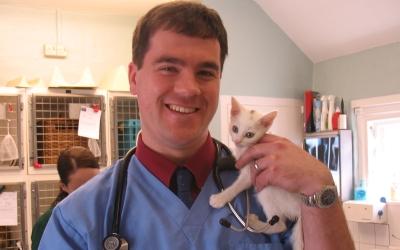Chris Palgrave
Chris Palgrave graduated from the Royal (Dick) School of Veterinary Studies (R(D)SVS) in 2007 where he completed both a PhD and the BVM&S degree.

He spent a year working in mixed practice in the USA before attending the veterinary anatomic pathology residency training programme at North Carolina State University in Raleigh, USA. He returned to the UK as a Lecturer in Veterinary Pathology at the R(D)SVS before moving to the School of Veterinary Sciences at the University of Bristol in 2012.
The research route
Like many students, I started vet school with the sole intention of being a mixed-practice vet. However, after the second year of the vet course I took the opportunity to take a year out to try research.
After two long years of physiology, biochemistry and anatomy this was an amazing chance to try research and use my brain to really think about something, rather than just memorising vast amounts of information!
PhD
At the end of this intercalated year I was awarded my BSc (Vet Sc) Hons. However, instead of returning to the vet course immediately, I stayed out for a further three years as a PhD student.
During this time I worked at both the R(D)SVS and The Roslin Institute, investigating how genetic differences in the immune system determine how different species fight infection.
General practice and residency
Upon graduation, in addition to working in practice, there were many career options open to me. Having both a vet degree and a PhD meant I was a strong candidate for a number of positions, including research, industry, academia/teaching or further specialist training (e.g. a residency).
In order to develop my clinical skills and experience, I worked for a year in mixed practice in the United States before attending the anatomic pathology residency training programme at North Carolina State University in Raleigh, USA.
Teaching and Research
As a Diagnostic Pathologist, Lecturer and Researcher, I now have the opportunity to use my clinical veterinary experience, research background and specialist training in pathology, to work in experimental and comparative pathology - focusing on questions which have direct and practical relevance to both human and animal disease.


